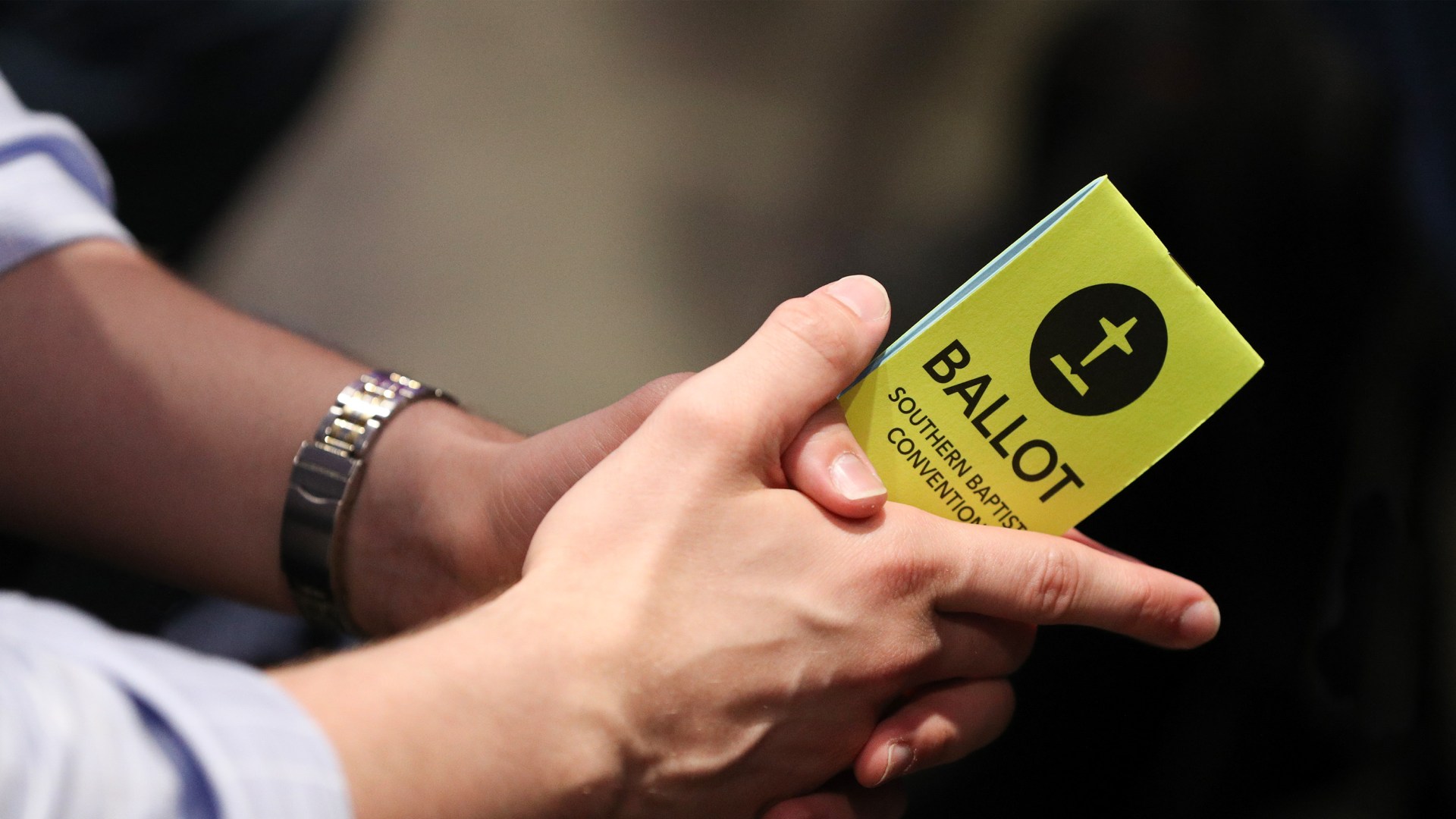Messengers from around the country will soon gather in Indianapolis to conduct the business of the Southern Baptist Convention. As in recent years, they will consider the exact relationship between the association and its member churches—a question of unique significance to Baptists who have historically valued local church independence.
This week, they will be asked to take final action on an amendment that would alter the SBC constitution’s understanding of a cooperating church from one that “closely identifies with” the complementarian stance of the Baptist Faith and Message (BFM) to one that “affirms, appoints, or employs only men as any kind of pastor or elder as qualified by Scripture.”
The proposal came in the wake of last year’s disfellowship of Saddleback Church after it installed three women as staff pastors (which an overwhelming majority of messengers understood to be in conflict with the BFM).
Despite this swift and certain response, proponents believe the Law Amendment, named after its author, Mike Law, is necessary to further unify practice. Others worry that such reforms move the convention toward a form of “subscriptionism,” which would use bureaucracy to enforce norms on individual churches, putting the SBC at odds with historic polity.
But the concern for Baptist identity highlights another, often overlooked, aspect of the debate: Historically, Baptist confessions were a form of public witness.
The earliest Baptist confessions emerged in 17th-century Reformation England, a time of tremendous social, political, and religious instability. Unlike their Presbyterian and Anglican counterparts, which established and enforced denominational teaching, Baptist public statements had an apologetic, even irenic, quality to them, telling outsiders who Baptists claimed to be.
This was essential in the early days because Baptist practices of believer’s baptism and church autonomy meant that they were often confused with more radical sects, including continental Anabaptists who refused to pay taxes, enter the military, or accept the legitimacy of civil rulers.
In fact, when representatives from seven London congregations gathered to craft what would become the London Baptist Confession, they met to “disclaime as notoriously untrue” charges of disorder and the “clearing of the truth we professe, that it may be at libertie.” And it worked.
Historian William Lumpkin, once professor of church history at The Southern Baptist Theological Seminary, wrote that “Outside the Baptist fellowship the Confession was received with unequaled surprise. People generally were amazed at the moderation and sanity of its articles.”
In this way, early Baptist confessions were used to present Baptist belief as reasonable and nonthreatening. The first editions of the London Confession were dedicated to Parliament as a way to petition for greater religious tolerance, and, according to Lumpkin, subsequent revisions had Parliament’s reception as a primary focus, reworking the language in response to contemporary critics. This backdrop also explains why early Baptists explicitly committed to submitting to civil authorities and living justly with their neighbors, even to the point of accepting the consequences of civil disobedience; or in the words of the London Confession, “not accounting our good, lands … and our own lives dear.” As Christians had for centuries before them, early Baptists understood persecution and martyrdom as a form of witness.
Recognizing witness—not simply organizational cooperation or resource distribution—as a major reason for Baptist affiliation also clarified grounds for disaffiliation. Confessions were not creedal documents but cooperative ones that allowed congregations to lean into the safety of shared communion for the sake of public witness. Should an individual or church walk in a way that would distort the gospel they professed, other members had a right, and perhaps even a duty, to withdraw from them.
Current debates in the SBC recognize this tension, but, for the most part, they tend to focus internally, framing questions as a matter of associational conformity with little to no attention given to the message being sent to outsiders. But when considered through the lens of public witness, questions that appear to be similar quickly show themselves to be very different.
For example, when a member church covers up sexual abuse or retains a sexual predator in leadership, they become a clear and obvious threat to the SBC’s shared testimony, not to mention a threat to the safety of surrounding society. As such, associated congregations must decisively and actively disfellowship from that church to preserve their own public witness and commitment to the common good.
But how to handle more internal disagreements, such as open table Communion (which many SBC churches practice despite the BFM) or women’s exact roles in local congregations, is less clear. While the SBC is unapologetically complementarian, as the disaffiliation from Saddleback Church testifies, the application of these principles varies from member congregation to congregation.
Because of the belief in local church autonomy, each defines the nature and extent of pastoral ministry slightly differently. Unlike other traditions, the SBC does not have a shared process for ordination or a definition of pastor, even as it attempts to regulate that very office.
Unfortunately, the Law Amendment does nothing to clarify whether pastor refers to the function, office, or title, relying instead on the sweeping statement “a pastor or elder of any kind.” When asked, proponents counter that “Southern Baptists know what a pastor is and who should be a pastor,” which unfortunately amounts to “we know it when we see it.”
One strange result of this lack of clarity has been the creation of a list of churches with women who hold staff positions under the title of “pastor,” regardless of the work they actually do within the congregation. A congregation with a woman named as a worship or children’s pastor is not distinguished from one with a woman who holds elder authority as a senior pastor (which would run counter to the BFM’s complementarian stance).
To be clear, Baptist confessional history unquestionably affirms doctrinal alignment as necessary for close association and cooperation. Early Baptists grouped themselves along soteriological convictions, and current Baptists must wrestle with similar boundaries. At the same time, however, messengers must consider whether the high level of scrutiny on women in this moment signals a disproportionate level of concern.
Unlike their Baptist forebears, the SBC currently maintains a “big tent” approach to some doctrines and practices, such as soteriology (Calvinist versus Arminian), leadership structure (plurality of elders versus senior pastor with a deacon board), and worship (contemporary versus traditional). What does it say to outsiders that SBC member churches are free to disagree about these issues, but a woman being named a children’s pastor is a bridge too far?
More concerningly, the Law Amendment would be located in Article III.1, which specifically names uncooperative churches as those who “affirm, approve, or endorse homosexual behavior,” mishandle sexual abuse, and discriminate on the basis of ethnicity.
Since June 2019 when the SBC Credentials Committee was reshaped to better respond to such churches, it has recommended the disaffiliation from 18 churches, including 6 for mishandling sex abuse and 6 for ordaining women as senior pastors. To outsiders, the numbers could suggest a strange parity between how the SBC views women in leadership and how they view predatory pastors.
As the nation’s largest Protestant association, the SBC may not feel the same need as its marginalized ancestors to preserve their public witness. Even so, its size and influence means that it must concern itself with how the Law Amendment will be perceived by outsiders.
Protecting public witness does not mean shifting doctrine or changing convictions about what Scripture teaches. However, it does mean weighing the wisdom and prudence of emphasizing minor differences, even as the SBC continues to be under public scrutiny for its treatment of women.
Like its early Baptist forebears, the SBC has taken an unpopular stand based on conviction and conscience. But the SBC would do well to also consider what their ancestors understood about public witness. Baptist confessions do not exist simply to monitor those inside the community but to communicate something to those outside it.
If the Law Amendment passes, it risks sending a message—not about what the SBC believes about the gospel or biblical fidelity—but that monitoring local churches to keep women in check is foundational to their identity.
Hannah Anderson is the author of Humble Roots and Heaven and Nature Sing. She is pursuing an MDiv at Duke Divinity School with a focus in theology and art.










